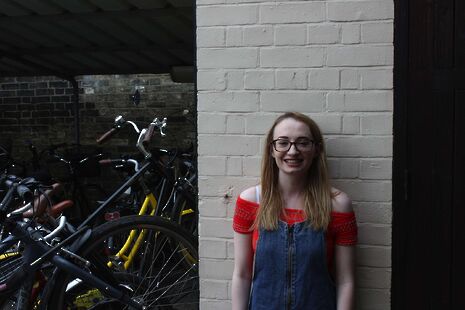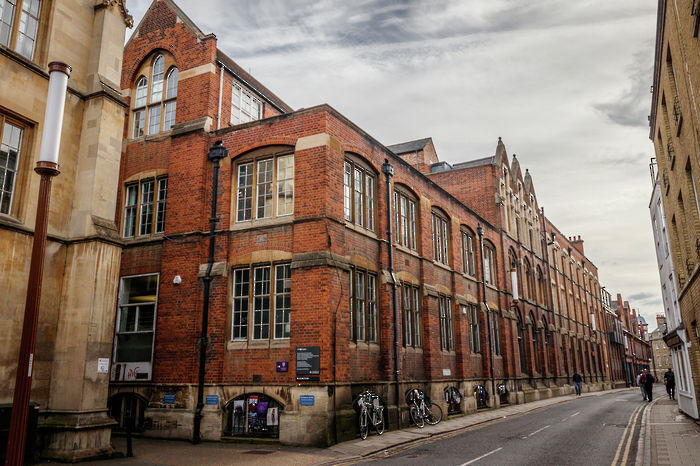‘It takes over your entire life. Everything you do, every day, every minute’: Evie Aspinall on her year in CUSU
Outgoing CUSU President Evie Aspinall reflects on the all-consuming nature of her job, feeling the need to prove herself, and navigating national media scrutiny

Asked to give an insight into her time as CUSU President, Evie Aspinall pauses and reminds herself under her breath: “Careful words.”
As Aspinall nears the end of her tenure as President of Cambridge University Students’ Union, she reflects on a year of structural reform, intense national media scrutiny, and of grappling with a sense that she had something to prove.
“Loads of people were like, ‘can she do it?’” Aspinall recalls the anxious weeks leading up to her first day as President. Aspinall positioned herself as the ‘outsider’ candidate during the 2018 Lent elections where, running against Siyang Wei and Connor MacDonald, she came to the role with the least direct CUSU experience of the three candidates.
“I thought ’well, actually, I’ve done lots of things that aren’t CUSU: I’ve been a women’s officer, I was president of like four societies in my last year. I know what I’m doing. I can do this.”
“I know what I’m doing. I can do this.”
But the skeptical response to her election, Aspinall notes, was as though people were simply wondering “’Will she get it?’”
So, too, was the Pembroke graduate concerned about what her fellow sabbatical officers – many of whom had gained prominence within student activism and organising – would think about her. “At the start, I thought ‘Oh my goodness – they’re going to hate me.’”
This anxiety quickly dissolved. “I met with a few of them informally beforehand and was like ‘they’re fine’, and they were like, ‘she’s fine actually’.
“Elections blow everything up, and the more you talk to them, the more you realise you agree on things.” Now, she describes the outgoing sabbatical team as good friends.
But the pressures persisted throughout the year, and this not in small part due to what Aspinall perceives to be the unique position of Cambridge in the national consciousness, as well as the political nature of the student body.
When asked whether being the students’ union President at Cambridge is different to being a students’ union President elsewhere, she responds without missing a beat: “Definitely.”
This year, CUSU has repeatedly been the subject of national media attention. “It’s almost like no matter what you say, they want to come for you. And by the end of it you’re like, ‘whatever, this isn’t personal’. It feeds their narrative, it makes sense to them.
“But it’s hard, and I think other students’ unions don’t always get the same scrutiny, although they do get a lot. Students’ unions are the epitome of ‘student snowflakes’: they tend to be quite left wing, they tend to be political, they tend to care about student welfare, stuff that you can now say is ‘snowflakey’.”
“It’s almost like no matter what you say, they want to come for you”
“You also have a very active student body in Cambridge that’s very political,” she notes, “so [they] will always want you to take a stance on something – there is so much pressure to take a stance – but the moment you take a political stance, you then have the backlash which comes with that.”
“But it’s one of those things: You put yourself in the public eye, you have to be prepared to deal with it. Maybe you’re not quite as ready for it as you’re expecting, but – yeah.”
These moments of media attention were among the hardest moments of the past year for Aspinall, and not simply due to the personal toll they took.
“You don’t actually have a chance to counter the narrative, so you just have to sit and wade the tide until it’s over. It’s also just really annoying because it’s a distraction”.
Being rendered “completely useless, and not doing what you want to do” when dealing with media attention, Aspinall notes, was particularly challenging.
A further challenge Aspinall highlights is the short tenure of a year held by the CUSU President, which she deems “nowhere near” enough time in which to carry out the role. She explains that while sabbatical teams can certainly “get the ball rolling” on the changes they wish to enact, implementing changes at a University level is “the slowest thing in the entire universe.”
“Everything takes years and years and years and years – and it’s so frustrating, because you’re like ‘oh, I’m going to do this thing’, but you know it’s not going to happen for like seven years.”
“Everything has about fifty committees,” she notes exasperatedly, naming University Card Committee – “the committee is just for your CAMcards” – as one of the many committees on which she sat this year.
For this reason, she says that some of the things she is proudest of having achieved this year are still yet to come to fruition.
“Everything takes years and years and years”
“That’s the thing – the stuff we do, you can’t see, because it’s in committees. And even stuff that’s happening now, it’s like, ’oh my god, this is so exciting and I know it’s going to be great, but students don’t know about it, and when they do find out about it it’ll be when it’s implemented in two years.’”
Working on the University’s mental health strategy, bringing college inequality under the remit of the Student Support Initiative, and kickstarting the provision of easily-accessible and transparent bursary information across colleges are among the “behind-the-scenes projects” Aspinall is most proud of, and would want her year at CUSU to be remembered for.
“But the thing is, I don’t know how [students] will remember it. [...] Ideally, if they knew what we were doing – college stuff, mental health stuff – I think we’ve genuinely made some really big steps in those areas.”
She admits that, perhaps for this reason, she struggled to switch off from the job after the working day had finished. “Cutting off after five is important, but it’s hard because I know students don’t work to those hours and I don’t want to be seen to not be doing my job.”
“That’s what you worry about. You’re like ‘oh, people think I’m not doing anything.’”
More immediate change has been possible at the college level, which Aspinall views as a key improvement made by this year’s sabbatical team.
“I don’t want to be seen to not be doing my job”
“The best thing we’ve done is engage more with JCRs and MCRs [...] They have more support than ever, they get on with CUSU, they feedback to us and we feedback to them, which empowers them in a way they weren’t before.”
She cites the coordination across colleges of resisting a welfare data return to the Office for Students [OfS] under the Prevent duty earlier this year as an example of the value of engaging colleges.
While colleges were officially asked to report the number of welfare cases ‘referred for specialist advice and support’, regardless of whether they related to Prevent, they were encouraged by CUSU, the GU, and JCRs to include all tutorial contact as a welfare case to avoid identifying individual students accessing mental health support and services.
“We were able to lobby, and multiple colleges didn’t do what they were supposed to because we informed JCRs who then informed colleges.
A Varsity investigation found that five out of thirty-one colleges followed CUSU and the GU's recommendations.
"That caused all sorts of a shit show – we still get shit at committees for it [...] But that’s fine. That was the point.”
The job, Aspinall reflects, has been “more stressful than [she] could have ever imagined. It takes over your entire life. Everything you do, every day, every minute.”
“It’s a lot, but it is really good and I’m glad I’ve done it.
“It’s really nice to have an actual job where you’re making a difference, and you’re you’re like, ‘actually, I care about what I’m doing.’ So it’s been really good – just tiring.”
 Interviews / ‘People just walk away’: the sense of exclusion felt by foundation year students19 April 2024
Interviews / ‘People just walk away’: the sense of exclusion felt by foundation year students19 April 2024 News / Climate activists smash windows of Cambridge Energy Institute22 April 2024
News / Climate activists smash windows of Cambridge Energy Institute22 April 2024 News / Copycat don caught again19 April 2024
News / Copycat don caught again19 April 2024 News / John’s spent over 17 times more on chapel choir than axed St John’s Voices22 April 2024
News / John’s spent over 17 times more on chapel choir than axed St John’s Voices22 April 2024 News / Fitz students face ‘massive invasion of privacy’ over messy rooms23 April 2024
News / Fitz students face ‘massive invasion of privacy’ over messy rooms23 April 2024







